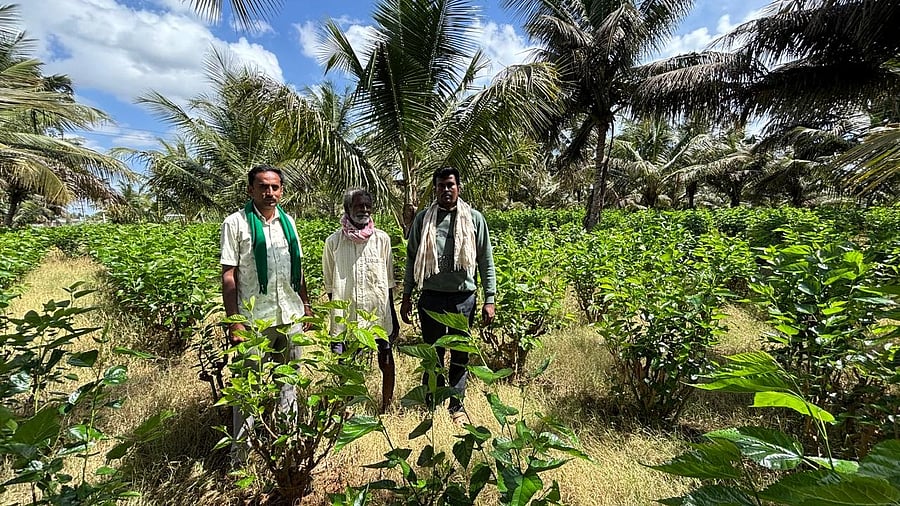
For instance, the districts surrounding Bengaluru supply about 60% of the city's fruits and vegetables -- an estimated seven to eight million tonnes annually.
Credit: DH PHOTO/ASHWIN B M
With farmers of Devanahalli, Bidadi, and several other districts protesting against land acquisition for industrial projects, concerns over the impact of such projects on Karnataka's food and nutrition security have grown serious. For instance, the districts surrounding Bengaluru supply about 60% of the city's fruits and vegetables -- an estimated seven to eight million tonnes annually -- while local dairies deliver over 10 million litres of milk every day. The logic of displacing happy and well-settled farmers when lakhs of acres of wasteland remain unused raises troubling questions about a Bengaluru-centric development model.
A recent brainstorming session by the Karnataka Forum of Public Intellectuals and Cultural Voices brought together affected farmers from several districts, corporate and MSME representatives, thinkers and academicians to discuss an "Equitable Industrial Land Use Policy for Karnataka". The meeting, held significantly on the birth anniversary of Devaraj Urs—who had spearheaded the land reforms in the state—was convened by Prakash Kammardi, former chairman of the Karnataka Agricultural Prices Commission.
Participants stressed the need to think “Beyond Bengaluru”, for active District Planning Committees, to set up industries in Kalyana Karnataka and to emulate Telangana's example of allocating only wastelands for industry. A major recommendation was to ‘reserve’ fertile agricultural land as “Food Security and Green Economy Zones”, similar to reserve forests, to prevent their diversion for non-agricultural purposes.
With BMRDA's Structure Plan having already fixed the water carrying capacity as the limiting factor for further expansion of Bengaluru --and ground water levels continuing to fall – participants called for a freeze on the city's sprawl.
They also demanded that every proposed land acquisition undergo a cost-benefit analysis, taking into account the environmental and social impact assessments – the cost of compensation and rehabilitation, livelihoods lost versus those created, loss of agricultural output affecting food security, and implications for the Sustainable Development Goals (SDGs). Only projects that meet these criteria, they said, should be sanctioned.
A major concern was the lack of transparency and accountability within the Karnataka Industrial Areas Development Board (KIADB). The KIADB Act itself prohibits it from acquiring fertile agricultural land for industrial purposes. Under the Right to Fair Compensation and Transparency in Land Acquisition, Rehabilitation and Resettlement Act, 2013, the informed consent of at least 80% of affected landowners is mandatory for acquisition. Yet, according to KIADB’s own 2022 survey, over 80% of farmers are unwilling to part with their land.
Speakers insisted that all land acquisitions must comply with the 2013 Act. They condemned the misuse of provisions under other laws-- such as the BDA Act – for projects like the Peripheral Ring Road, where notifications were issued decades ago, freezing farmers' land use and sales rights. Compensation, they argued, must be based on the land's current market value at the time of development. Some suggested that displaced farmers should be made shareholders in the industries taking over their land.
Participants questioned why the KIADB was behaving more like a real estate agent than a promoter of industry. In several cases, land within industrial complexes was being diverted for private clubs and boathouses. Agents profited from land deals while several large companies left allotted plots unused, with no follow-up audits or penalties. Unused industrial land, they argued, should either be reacquired for public use or returned to the original farmers, instead of being freely resold.
Equally puzzling, they said, was KIADB's acquisition of land for airports -- well outside its industrial mandate. Speakers questioned the ‘madness’ of building new airports when existing ones, such as in Shivamogga, have turned dysfunctional. Several victims movingly recounted how they had lost their land to such projects, spent years fighting legal battles, and ended up empty-handed after paying agents and lawyers.
The imbalance between land allotted and employment generated was another key issue. One major IT company had received 300 acres but provided only 20,000 jobs – whereas experts estimated that 30 acres would have sufficed. In contrast, an MSME functioning on just 45 acres of land had created thousands of jobs. Participants urged the government to prioritise land allocation to MSMEs, which generate far more employment per acre than big industries.
The five chief demands emanating from the brainstorming were:
1) A comprehensive land use and acquisition policy should be framed within a set timeframe after wide consultation with all stakeholders.
2) A white paper must be published on all land acquired so far by KIADB and other agencies, detailing its utilisation and employment outcomes.
3) No new land acquisition should be undertaken until the white paper is published.
4) The disastrous amendments to the Land Reforms Act introduced by the previous government should be rescinded, as promised.
5) Priority should be given to using wastelands for industries while allocating land to the landless and homeless for education and health.
These final recommendations from the brainstorming were formally submitted to the CM on September 22 for consideration and action.
(The writer is the Executive Trustee of CIVIC-Bangalore)
Disclaimer: The views expressed above are the author's own. They do not necessarily reflect the views of DH.